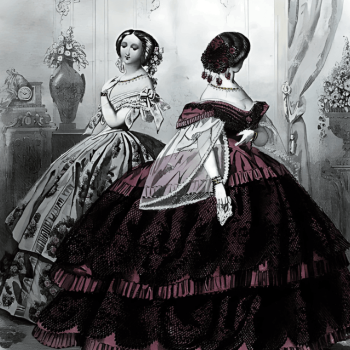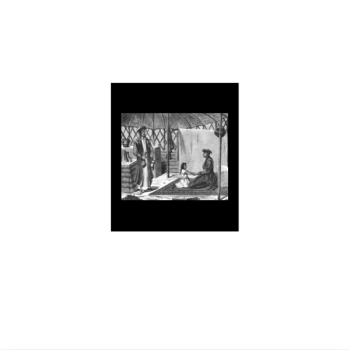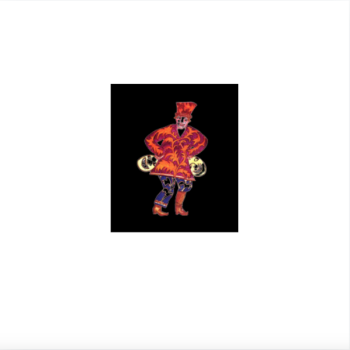“A WINTER EVENING.”
Winter 1842.[1]
Helena Andreevna was sick so often that winter, that the doctors did not allow her to do as much work as she wished. To take her away from work, and entertain her somewhat, Colonel Hahn prepared to visit Kursk where his mother, Oma Lizaveta, lived there in the village with her daughter. Although they were very affectionate towards the Hahn children, the siblings did not have even a shadow of the feelings for them that they had Helena Andreevna’s relatives. They stayed with them for too short a time, and they instinctively sensed that these new relatives were trying to show them affection and love, and not just love like their dear Baba Lena and Dede Andrushka. The children, of course, could not understand that Oma Lizaveta was seeing them together for the first time. She had lost the habit of seeing her son, and she hardly knew Helena Andreevna. Nevertheless, Lelya soon made friends with her cousins and happily ran around the house with them. Vera felt like a stranger. Despite her cool attitude towards her daughter-in-law in the past, Oma Lizaveta was cheerful with her grandchildren, and a lively talker whom Vera found very beautiful. She realized, now, where Lelya got such curly, white hair, and she resembled Oma Lizaveta in both face and liveliness.
Returning home, they capsized in deep snow. Everything turned over in their wagon, and Vera was so covered with pillows and luggage that Colonel Hahn forcibly found and dug her out. Everyone was scared, wondering if she was hurt. Fortunately, she was just scared and completely unharmed. Perhaps the fright affected her, for Helena Andreevna caught a cold on the road, and as soon as they returned home, she went to bed. They sent to Kharkov for the doctor who had already visited Helena Andreevna once or twice. He shook his head and said that she needed serious treatment and called her to move to the city. When the doctor left, however, Helena Andreevna said that she would never move to Kharkov; and if necessary, she’d rather go to Odessa in the spring for treatment.
A week later, Helena Andreevna got up quickly and, apparently, completely recovered. Vera was terribly happy about her recovery and continued her classes and long conversations with Antonia. Everyone was surprised at Vera’s change during this winter, saying that she suddenly became “so quiet and serious, just like a big girl.” She was in her seventh year, and from that time on she often thought about things that had never even occurred to her before. She really enjoyed quietly sitting down in a corner somewhere in the evenings, listening to the reading of grownups who were unaware of her presence, and drawing her own conclusions. Sometimes Colonel Hahn also sat at the large table and listened, drawing funny caricatures of horses and guns, and sometimes portraits of his friends, which were always very funny, (although they were similar.) More often than not, however, he was not at home. Lelya would do homework or study with Miss Jeffers. Vera, who did not have classes in the evenings, always sat down with Antonia and her mother.
Most of all, Vera loved listening to her mother play the piano and sing. No matter what she was doing, as soon as I heard the sound of the lid on the piano, she would drop everything and run into the hall. Then she would hide behind the door, behind the stove, or somewhere in a corner where she would not be disturbed, and from where she could clearly see her mother’s face. It seemed to her that no one in the world could sing like her mother, and there was no one more beautiful than her in the world. One evening a howling blizzard was raging in the yard, and the wind covered their windows with ice and frozen snow. The stove was burning in the corner; the wood crackled, and the flames flared brightly, illuminating the room with an uneven light. Helena Andreevna quietly paced around the room for a long time. Antonia sat on the sofa knitting a stocking, her knitting needles rattling in the semi-darkness. Vera sat quietly at her feet, on the carpet, with her head on her lap, watching all of her mother’s movements; the play of light on Helena Andreevna’s face and the ribbon of light that ran across the bottom of her dress every time she walked past the door crack from Lelya’s brightly lit room. Helena Andreevna suddenly stopped and, played a chord on the piano.
“This is when it’s good to sing “The Storm!” she said, sitting down at the piano. Helena Andreevna then began playing something quiet and melancholic and sang:
O’er the earth a storm is prowling,
Bringing haze and driving snow.
Like a beast I hear it howling,
Like an infant wailing low.
Now the thatch it rustles, playing
On our roof; now at our pane
Raps like someone homeward straying
And benighted in the plain.
Old our hut is, dark and dreary.
By a candle dimly lit—
Why so sad, my dear, and weary
At the window do you sit?
Is’t because the storm is moaning
That bemused and still you keep?
Does your spindle’s mournful droning
Put you quietly to sleep?
Come, O comrade solitary
Of this cheerless youth of mine,
Let us fill our cups and bury
All our woes in frothing wine!
Of a maid out by a river
Sing a little song to me
Of a busy bird that never
Leaves its home beyond the sea.
O’er the earth a storm is prowling,
Bringing haze and driving snow.
Like a beast 1 hear it howling,
Like an infant wailing low.
Come, o comrade solitary
Of this cheerless youth of mine,
Let us fill our cups and bury
All our woes in frothing wine![2]
Vera listened eagerly to her singing and wonderful words. When her mother reached that place in the song “Of a busy bird that never leaves its home beyond the sea,” Vera could hardly sit still with delight! She just wanted to throw herself on her mother’s neck and kiss her deeply. Helena Andreevna’s voice sounded sweet, interrupted only by the howls of the wind, as if it were really shaking their hut, now crying pitifully like a child, now howling like a wild animal. The poor shack of the “old people,” their lonely, sad life; the old woman, depressed behind her spindle, and the old man, begging for a song out of boredom, introduced themselves so vividly to Vera. She felt so sorry for them that she listened and listened and suddenly…she began to cry bitterly. Helena Andreevna turned around, surprised, and saw that Vera was crying, came up to her, alarmed.
“Nothing, Mamochka,” Vera said through tears, annoyed at herself for interrupting her mother’s singing with her crying. “Sing! Please keep singing! It’s so good! It’s nothing! It’s just a pity! These poor old people!”
“Oh, you are a sweet, silly girl!” said Helena Andreevna.
Sitting down on the sofa, she took Vera on her lap and caressed her, smiling and comforting her with the fact that the “old people,” on the contrary, were having a lot of fun—that they were singing songs and drinking beer from a mug. Vera laughed and begged her mother to continue.
“No, that’s enough for today!” said Helena Andreevna. Turning to Antonia, she added quietly. “Je vous demande un peu! Qu’en dites vous? Ce sont les nerfs, Dieu me pardonne!”[3]
They then brought candles, and no matter how much Vera begged, Helena Andreevna did not sing again that evening.[4]
-
- MOTHERS & DAUGHTERS
- A LANTERN
- CHRISTENING OF THE DOLL
- DASHA & DUNYA
- GRUNYA
- NANNY NASTYA
- NANNY’S FAIRYTALE
- CONFESSION
- IN THE MONASTERY
- PREPARATIONS FOR THE HOLIDAY
- EASTER
- THE DACHA
- THE MELON POND
- MIKHAIL IVANOVICH
- THE WARLIKE PARTRIDGE
- LEONID
- NEW WINTER
- HISTORY OF BELYANKA
- THEATRES AND BALLS
- YOLKA
- REASONING
- ROAD
- CAMP
- IN NEW PLACES
- THE GRAY MONK
- VARENIKI
- THE TRIP TO DIKANKA
- WHAT HAPPENED IN THE DOLL HOUSE
- ANTONIA’S STORY
- “A WINTER EVENING”
- THE BLACK SEA
- CRIME AND PUNISHMENT
- PANIKHIDA
- PRINCE TYUMEN
SOURCES:
[1] Fadeev writes: “My stay in Petersburg lasted until March 31. I could have left a little earlier, but I wanted to stay until the end of my son Rostislav’s examinations, who had come with me from Saratov especially for this purpose. The examinations went off without a hitch and my promotion to officer was soon to follow, but I could no longer wait for this, I had to return to the Province. I often visited Perovsky in Petersburg and it seemed as if he had no special prejudice against me; on the contrary, before leaving, he seemed to have shown me his goodwill […] On March 31st I left Petersburg, leaving my Rostislav alone, awaiting his commission as an officer. I stayed in Moscow for several days, staying with a Saratov landowner I knew, who managed the estates of Count Guryev, Berkholz, a Russian German, a smart, active man, and at the same time a great talker and braggart. He sometimes told such incredible stories in the most simple-minded tone that his interlocutors were completely at a loss whether to laugh at him or whether he was laughing at them […] At the same time, my old acquaintance Pyotr Aleksandrovich Kologrivov, a great gourmet and lover of good food, arrived in Moscow from St. Petersburg. He had already told me more than once with enthusiasm how wonderfully they feed at the Troitsky tavern, and now he wanted to prove it to me in practice: he took me with him to the tavern, inviting several of his acquaintances there as well. Indeed, they fed us well, but they also ripped us off handsomely: for a dinner for six people, without any special frills, they charged 150 rubles gray, which was a considerable amount of money at the time. Having left Moscow on April 7, I had to drag myself along a very bad road, as usually happens in Russia in the month of April. It was a good thing that I had a pleasant companion with me, Grigory Vasilyevich Esipov, who was then serving in Saratov, and a local landowner. On the bank of the Oka we had to sit the whole day in a disgusting, dirty peasant hut, waiting for the ice to break up and for us to cross to the other side. With difficulty we arrived in Saratov on April 17. Here I found a lot of squabbles and all sorts of unpleasant activities. In my absence, the vice-governor Ode-de-Sion had quarreled with the provincial leader of the nobility, Stolypin, who was also a tax farmer; the result of their quarrels was the prohibition to elect Stolypin as provincial leader. I was also given a lot of trouble by General Arnoldi, who was living in Saratov at that time, whom I mentioned above, commanding six batteries of horse artillery, quartered in the Saratov province. A brave general, distinguished in battle, who lost a leg in the last Turkish war and therefore walked on a wooden leg, but by his character and habits a real Russian Vandamme. Probably, by virtue of some logic, understandable only to him, he formed such a conviction for himself that everything he liked from anyone, he must certainly take into his own hands. He tried, as far as possible, to act steadfastly, in accordance with this rule, often very inconvenient for others, and in suitable cases he did not spare either friends or subordinates; he took possession of the meadows and pastures of the inhabitants, where his artillery was quartered, without any mercy or even necessity, as if from some kind of greed, which extended to the point that he used means to acquire what he wanted that were sometimes not entirely plausible […] At that time she received as a gift from our good friend and partly her relative, through her sister Anastasia Pavlovna Sushkova, Alexander Alexeyevich Panchulidzev. Penza Governor, a beautiful collection of hothouse plants, which, together with our previous flowers, in the summer, were placed on the balcony and in the front garden in front of the balcony, which overlooked a large square, or rather a field, separating the country house from the city. On this field General Arnoldi inspected his artillery in the summer and sometimes came to visit us. He paid attention to the flowers, examined them, praised them and hinted to Elena Pavlovna that he would like to buy some of them. She gave him some of the flowers he had mentioned, but not all, because she valued them herself. Two days later, in the morning, it turned out that the balcony and the front garden were empty—the flowers had disappeared without a trace during the night. We were very unpleasantly surprised by this, and the more so because at the porch of the house, though on the side, there was a sentry on guard, who assured us that he had neither seen nor heard anything; and in order to steal such a quantity of plants, some of which were of a larger size, in heavy tubs and pots, drag them across the high front garden and take them away, no small number of people and almost a whole convoy of carts were required. Doubly interested in this case, as the robbed owner of the house and as the governor, I resorted to police measures and on the same day it was discovered that our flowers had been stolen by order of General Arnoldi, who had sent several carts for this purpose at night, with a corresponding number of his artillerymen, having given them full instructions for carrying out this maneuver with all the art of military cunning. All the flowers were transported to the general’s apartment, where they remained completely. After such a discovery, of course, we could only regret the loss of our flowers and resign ourselves to this fate, which is what we did.” [Fadeyev, Andrei Mikhailovich. Vospominaniia: 1790-1867. Vysochaishe Utverzhd. Yuzhno-Russkago. Odessa, Ukraine. [Russian Empire.] (1897): Part I: 166-170.]
[2] Vera states that this song was called “The Storm.” These lines, however, are from Pushkin’s poem, “Winter Evening.”
Pushkin, Alexander. Alexander Pushkin Selected Works In Two Volumes. Volume I: Poetry. Progress Publishers. Moscow, Russia. (Un ion Of Soviet Socialist Republics. (1922): 27-29
[3] [Fr. “I ask you a little! What do you think? These are nerves, God forgive me!”]
[4] Zhelihovskaya, Vera Petrovna. How I Was Little. A. F. Devrien. St. Petersburg, Russia. (1898): 242-247.













